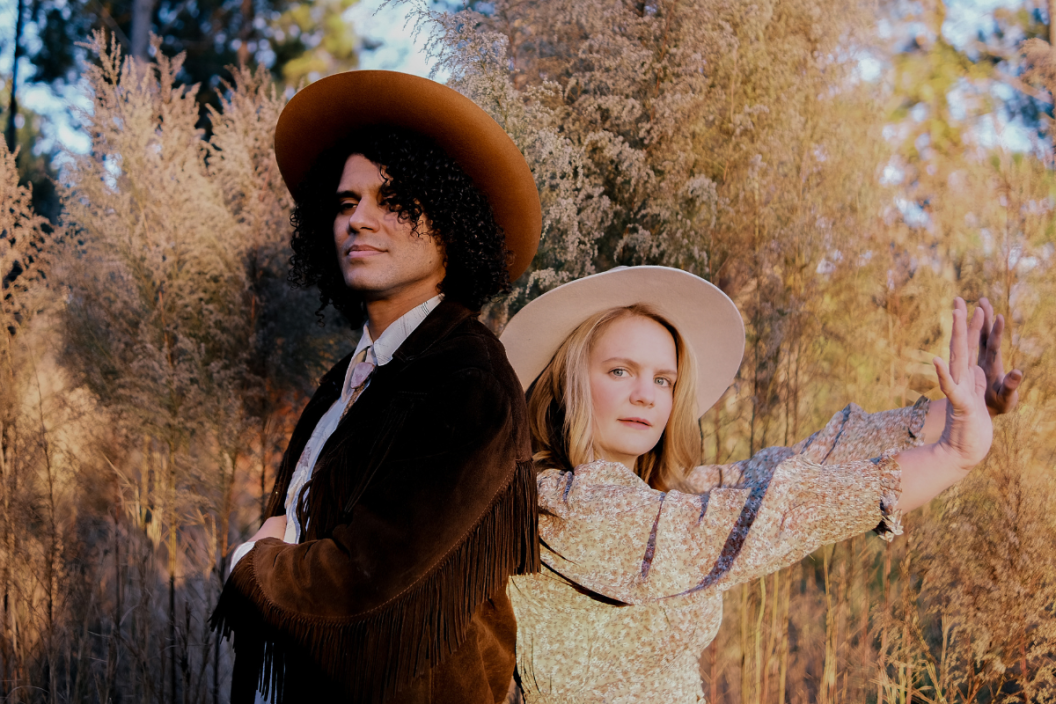Selkie folklore lies at the heart of Violet Bell's brand new album, Shapeshifter. In Celtic mythology, a selkie (seal folk) is enslaved by a fisherman after he steals her seal skin. She is even forced to bear him a child. It's not hard to imagine how timeless such a story remains. Across 10 songs, musicians and songwriters Lizzy Ross and Omar Ruiz-Lopez wield this ancient cautionary tale as a fiery torch and comb together current socio-political matters.
"For generations, people who don't fit neatly into social norms and power structures have fought for their bodily autonomy and personal agency," Ross and Ruiz-Lopez share. "Through a lens of queerness and otherness, the selkie story becomes a way to engage with this history and challenge the social norms that would keep us small."
Shapeshifter ebbs and flows between perspectives, guiding the listener through seashell-strewn shorelines and high tides with a startlingly bright musical agility. "Fish to Catch" alarms with the fisherman's lonesome cries and bedeviling desperation, drawing a clear parallel to modern times in how "fear that fuels institutions based on greed and extraction," the band says. Whereas, "Back to the Sea" finds the selkie reconnecting with her skin. The endless ocean sweeps her away, and her pleasure is a limitless foray into the unknown, patched with a renewal and strength, as depicted with the blissful instrumental piece "Flying Free."
"When we share the selkie songs at live shows, listeners come up to us with shining eyes and opened hearts. People are so hungry for stories of hope and change. For us, sharing this medicine is also receiving it. It's healing," Ross & Ruiz-Lopez said. "We're so grateful to connect the past — this ancestral gift of story and song — with our present-day experience as we envision our collective future."
Shapeshifter settles comfortably into the selkie story and "transforms the old narrative into a new story that grants people vast permission to be themselves, unencumbered, in all their complicated glory," says Ruiz-Lopez.
The deceptively-chipper "Fisherman's Daughter" unpacks Carl Jung's sage wisdom: "There is no greater burden on a child than the unlived life of a parent." In the tale, the selkie makes the hard-life decision to leave her daughter on land, but it's a choice that imbues them both with vitality. It's about breaking "the cycle of maternal martyrdom," he notes.
Later, "I am a Wolf" vines together the two perspectives, the fisherman's with the selkie's, into a complex tapestry detailing the demands and expectations set squarely upon women's shoulders. "I'll take you down deep in my waters where there is no king, where my mother sings," Ross snarls, over bristling strings. The sharpness of her lyrics draw blood, at least in a metaphorical sense. Then, similarly barbed words wrap tentacles around a swampy musicality with "Mortal Like Me," in which Ross dons the fisherman's perspective anew. His mental state deteriorates, and he struggles with the sins he's committed, it all coming undone with a wind-chapped gust coming in from the sea.
Songs like "All the Stars," "Meet Me in the Garden," and "Junkie" zip outside of the lines, yet it's all interconnected. Each part operates to serve the overarching whole. "It was a community effort, and the music feels alive," says Ruiz-Lopez. "It reflects the counter-imperative to oppression: be. Love. Live joyfully and free. Reclaim the splintered pieces of your soul. You can come home to yourself."
Produced with the Grammy-nominated Jason Richmond (Avett Brothers), the record boasts contributions from Joseph Terrell & Libby Rodenbough (Mipso), Tatiana Hargreaves, and Joe Troop (Che Appalache). The instruments ring with a reedy warmth, glistening off the tenderness in Rose's vocals.
Amidst its intricate storytelling, Shapeshifter engages with the storied history with American-made music, as well. Ruiz-Lopez explains, "By telling the story through music that both owns its diverse cultural heritage and defies categorization, we're teasing apart the homogenizing narrative of American roots music to reveal a more complicated and deeper truth."
Those truths, he continues, can be answered through the album itself. "'Shapeshifter' asks, 'What does it mean to feel whole, embodied and at home in our sense of agency and autonomy?'" he ponders. "What happens when we orphan parts of ourselves in order to stay safe? How do we internalize external power systems, and how can we integrate and heal what we've cast into the shadows?"
Check out Shapeshifter before it drops this Friday (October 7) down below.
READ MORE: Violet Bell's 'Fisherman's Daughter' is an Ancient Tale for Modern Life [Premiere]




